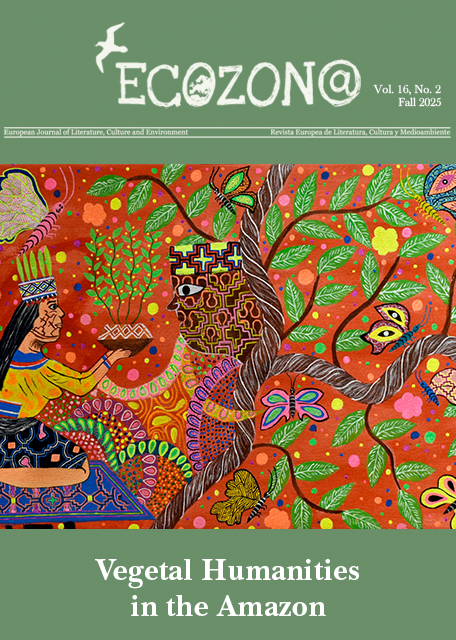<b>The Postcolonial Ecopoetics of Patricia Grace’s <i>Tu</i>: The Compost and The Labyrinth</b> // La ecopoética postcolonial en <i>Tu</i> de Patricia Grace: El compost y el laberinto
DOI:
https://doi.org/10.37536/ECOZONA.2019.10.1.2760Schlagworte:
Ecopoetics, postcolonial fiction, New Zealand/Māori literature, human/non-human mesh, labyrinth and compost, the mind and the world // Ecopoética, ficción postcolonial, literatura maorí/de Nueva Zelanda, malla humana/no humana, laberinto y compostAbstract
This article argues that renowned M?ori/New Zealand writer Patricia Grace devises an ecopoetics of randomness and design in her novel Tu through the manifold image of the labyrinthine compost. The biological processes of the compost and the spatial dynamics of the maze complement one another in this narrative. Both the maze and the compost foreground the liminality, the ordered and chaotic aspects, of physical dwelling places and social structures. The tortuous layout as well as the putrefying and recycling dynamics characterising the war-torn environment of Tu are mirrored in the intricate prose of the main protagonist’s diaries. His complex psychological regeneration is also influenced by composting processes. Grace’s labyrinthine compost evokes a “postcolonial ecopoetics” that debunks the loaded associations of randomness with life-threatening wildness, and of design with ordered civilisation, associations which characterised much of the colonial ideology. Whether construed as biological, spatial or cultural concepts, chaos and order in the maze-like compost of Tu appear as complementary rather than completely opposed processes.
Resumen
Este artículo sostiene que la reconocida escritora maorí de Nueva Zelanda Patricia Grace concibe una ecopoética de aleatoriedad y diseño en su novela Tu a través de la imagen múltiple del compost laberíntico. Los procesos biológicos del compost y las dinámicas espaciales del laberinto se complementan entre sí en esta narrativa. Tanto el laberinto como el compost ponen de relieve la liminalidad, los aspectos ordenados y caóticos de las viviendas físicas y las estructuras sociales. El diseño tortuoso, así como las dinámicas de putrefacción y reciclaje que caracterizan el entorno devastado por la guerra de Tu se reflejan en la intrincada prosa de los diarios del protagonista principal. Su compleja regeneración psicológica también está influenciada por los procesos del compostaje. El compost laberíntico de Grace evoca una ?ecopoética postcolonial” al desacreditar las asociaciones cargadas de aleatoriedad con el salvajismo que amenaza la vida, y de diseño con civilización ordenada, asociaciones que caracterizan gran parte de la ideología colonial. Ya sea que se interpreten como conceptos biológicos, espaciales o culturales, el caos y el orden en el compost laberíntico de Tu aparecen como procesos complementarios en lugar de completamente opuestos.
Downloads
Downloads
Veröffentlicht
Ausgabe
Rubrik
Lizenz
Authors who publish with this journal agree to the following terms:
a) Authors retain copyright and grant the journal right of first publication with the work simultaneously licensed under a Creative Commons Attribution License that allows others to share the work with an acknowledgement of the work's authorship and initial publication in this journal (CC BY-NC for articles and CC BY-NC-ND for creative work, unless author requests otherwise.
b) Authors are able to enter into separate, additional contractual arrangements for the non-exclusive distribution of the journal's published version of the work (e.g., post it to an institutional repository or publish it in a book), with an acknowledgement of its initial publication in this journal.
c) Authors are permitted and encouraged to post their work online (e.g., in institutional repositories or on their website) prior to and during the submission process, as it can lead to productive exchanges, as well as earlier and greater citation of published work (See The Effect of Open Access).










